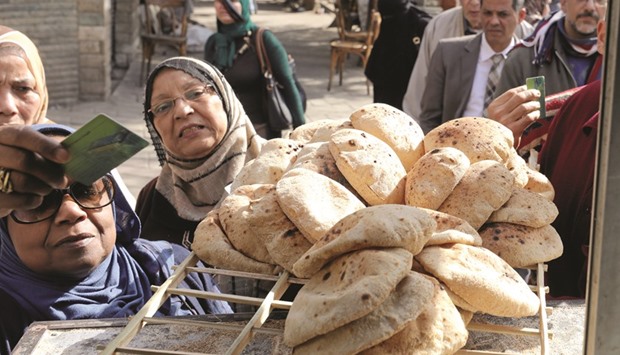Since Egypt devalued its currency, life in Cairo has gotten a lot easier if you sell stocks for a living – and a lot harder if you sell fruit.
Mostafa Nagaty at Arqaam Capital says he’d begun to fear that “this profession was dying.”
Investors had fled Egypt after the uprising of 2011, and strict exchange-rate controls helped keep them away. Then, four months ago, the central bank let the pound float. “Now I’m getting approached by all types of clients,” said Nagaty, who’s head of institutional sales. “It’s amazing how things have changed.”
Across the Nile, and visible from Nagaty’s office window, is the working-class district of Embaba where Gamil Hassan has a market stall. Things have changed for him too, and not in a good way. After the pound lost half its value, inflation surged to 30%. “People don’t buy 3 or 5 kilos of fruit any more, they get just enough for the day,” Hassan said. “I’m used to prices going up. But what’s happening now is just crazy.”
There are about 92mn Egyptians. Hardly any of them care about the price of stocks. Almost all of them care about the price of food. And popular revolts have toppled two presidents in six years. So a reform programme based around devaluation represents a big political risk. The government says it’s bitter medicine for an ailing economy.
Will the public remain patient until it kicks in?
President Abdel-Fattah El-Sisi is urging them to take the long view. The country had run out of options, he says. So far, the former army chief appears to be getting the benefit of the doubt. The streets are mostly quiet, parliament is docile, and the media only airs skin-deep criticism of his rule, if any.
It’s a stark contrast to the way previous efforts to remodel the economy were greeted. When President Anwar Sadat slashed food subsidies in 1977, an eruption of protests forced him to back down two days later.
As unrest dragged on for years after the ouster of Hosni Mubarak in 2011, successive governments – however cash-strapped they were – avoided borrowing from the International Monetary Fund, worried that they’d be obliged to take unpopular measures.
The resistance ended when Egypt signed a $12bn deal with the Fund in November – a week after floating the pound and raising fuel prices, which were seen as preconditions.
Exhaustion and repression are keeping Egyptians quiet for now, according to Yasser El-Shimy, a visiting fellow at the European Council on Foreign Relations. The public has endured “years of socio-political turbulence,” while El-Sisi’s government has been “eliminating venues for political action,” he said. Thousands of activists have been jailed, and opposition groups including the Muslim Brotherhood have been outlawed.
That’s not a formula for enduring change, El-Shimy said. It’s more like “a pressure cooker. Perhaps the government will relax the lid before it’s too late. But for now, the plan is to seal that lid shut.”
Financial markets aren’t feeling the same pressure. Foreigners are taking advantage of the weak pound to scoop up Egyptian debt, which pays almost 20%. Stocks hit a record high in January, albeit only in local-currency terms. Investors from Europe, the US and the Gulf have been flocking again to Cairo, meeting officials and local bankers.
That’s a welcome development, but it doesn’t tell the whole story, former Deputy Prime Minister Ziad Bahaa el-Din acknowledged in a newspaper column after meeting a group of them. “The problem is that the economic reality witnessed by the people every day is totally different,” he wrote. “It’s dangerous when the gap gets this wide.”
Economists say the currency float and IMF support will in time trigger an increase in foreign direct investments, boosting jobs and exports. Nagaty, the equity trader, says the stock market is also still in a testing phase. He says he has clients who are now thinking about committing larger sums, which should keep the rally going. But, he says, those people worry about politics too.
“The main concern for investors is the risk of social unrest,” he said. “It’s not to be taken lightly. It could reverse everything that’s happening now.”
El-Sisi often addresses that concern in his speeches. In December, he pleaded with the people to wait six months, after which “things will be much better.” In January he promised Egyptians that they won’t be left “hostage” to the free market – and that the pound will recover to a fair value, also in six months’ time. In fact, a February rally didn’t last and the currency remains near post-devaluation lows.
The crackdown on dissent has been relentless, but when it comes to his economic plans, El-Sisi has been willing to change course when there are signs of opposition. Earlier this month, a proposal to tinker with bread subsidies was quickly rolled back when there were demonstrations outside a few bakeries – even though the measure would only have affected a small minority of Egyptians.
Officials have said inflation will soon peak. To ease the pain, the finance ministry is planning to raise tax thresholds and offer discounts to low income individuals, as well as expanding a programme that targets the poorest 20% of the population.
Of course, there’s no guarantee the IMF programme will revive Egypt’s economy in the longer run – or, even if it does, that stability will ensue. “We tried, in the years that preceded the 2011 revolution, to depend on rapid economic growth in the absence of a social policy and an open political climate,” former deputy premier Bahaa el-Din wrote in his column. “Do we have to make that mistake again?”

People buy bread at a bakery in Cairo on March 9. After the pound lost half its value, inflation surged to 30%. There are about 92mn Egyptians. Hardly any of them care about the price of stocks. Almost all of them care about the price of food.
